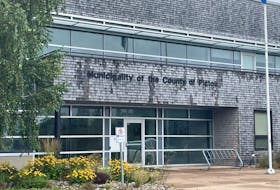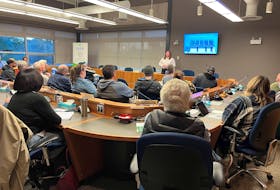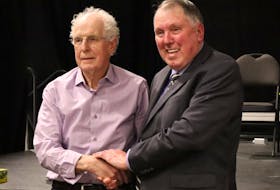YARMOUTH, N.S. – The chair of the Tri-County Regional School Board had harsh words while other members fought back tears in expressing their reaction to a decision to dissolve elected school boards, saying they are concerned for students in rural parts of the province.
Who will advocate for these students? This is the question many board members are left asking.
Board chair Michael Drew said the report on administration in the education system by education consultant Avis Glaze and the government’s decision to support the recommendation to get rid of seven elected English boards has “taken the public out of public education to move from educational democracy to educational bureaucracy.”
He pulled no punches in describing how board chairs felt they and board members were treated when Glaze met with them as part of her consultations.
“We feel betrayed by who she presented herself to be from the get-go, and that this was a tactic to have us open up and feel that we were in a safe zone but we’re weren’t. The words we used, were words used against us,” he said.

Drew said the report contains little research and is based more on anecdotal evidence. He isn’t disputing the fact that there are areas of improvement for school boards. He said the energy that will go into dissolving them should instead go into more training and better clarifying the role of elected boards. He also said he pleaded with Education Minister Zach Churchill not to enter into an experiment that had already been tried in New Brunswick when that province did away with elected boards in favour of a system of parent advisory groups and superintendents. The province has since returned to elected boards.
Board member Andrew Huskilson-Townsend of Shelburne County said cancelling the democratic process of electing a school board will take away people’s voices within the system and make it more challenging for them to navigate parts of the system.
“I have a child in the system and a three-month old . . . if schools boards are gone who is going to advocate for them?” she said, choking back tears.
“Our current model isn’t perfect, it does have plenty of room for improvement. But completely dismantling it isn’t the answer either.”
The CSAP francophone board will remain and the province plans to put in place a provincial advisory council as a replacement for the other elected boards. In her report Glaze speaks to enhancing the local voice with the creation of vibrant school advisory councils (SACs).
But Huskilson-Townsend said in rural areas many SACs struggle to fill all of their positions with needed volunteers. “And that’s without the additional workload that will come along with this model,” she said. “Board members spend a lot of time, and do a lot of heavy lifting. You can’t expect a SAC volunteer to take on a full time job, being on call 24/7, for a position which is accompanied by tons of criticism.”

The report does contain things that Huskilson-Townsend likes. For instance, she pointed to principals focusing on student achievement as their number of priority and the hiring of school managers to look after the day-to-day operational things in schools that monopolize the time of principals.
“The majority of the recommendations (Glaze) made, school boards have been asking for for years. We didn’t need her coming to Nova Scotia for six weeks, and collecting $75,000 plus expenses, to tell us this,” she said. “Boards are capable of carrying out the majority of the recommendations if given the capacity to do so.
It's only the people elected to serve on boards that will lose their roles. Those who work at central board offices will continue to work in the system.
“I’m not worried about the loss of my job, “ she added. “I’m worried about the loss of the local voice when it comes to advocating for all students.”
This sentiment was expressed by others around the board table.
“I’ve heard it said a couple of times – board members are upset because they are losing their jobs. That is so far from the truth,” said board member Donna Tidd of Digby County. “I don’t do this for the money. I don’t need the aggravation. I don’t need grey hair. I do it because I am concerned about the students in this province, that’s why I do this.”
Added her colleague Janice Francis, the Mi’kmaq appointed board member, who makes a four-hour return trip to and from her home to attend the board meetings, “I’ve never considered this a job. It’s a privilege to be here.”
Board member Faye Haley of Digby County said what bothers her most is the move to centralization. She pointed to creation of one provincial health authority years ago.
“How is that working for everybody? Is that a better system, I think not.”

She worries that the rural parts of the province will suffer in this new scenario.
Both Glaze and Education Minister Zach Churchill have indicated that doing away with the elected boards is not about money, but about improving the system so it does not operate in separate silos. Still, there has been talk of redirecting the savings.
Haley said there won’t be huge cost savings from dissolving the elected boards. In the Tri-County board she noted board governance only accounts for 0.4 per cent of the board’s overall nearly $84-million budget. Board governance is budgeted at $320,214.
An area Haley feels more focus should be directed at is the curriculum mandated by the education department.
“It’s not working. It gets tinkered with over and over again, the results either don’t change or take a downward dip,” she said.
Board member Sandra Fitzgerald of Yarmouth County agreed.
“Those teachers are told this is your curriculum, if children don’t get it push them along. Don’t fail them. Push them along,” she said. “Our government has failed our children. Not the boards. And now they’re taking our voice away.”
Teachers, she said, are overworked and there are parents who struggle to access resources.
“Our government is who is failing the kids, not the boards,” she said.
As the Jan. 25 special board meeting went on, board members around the table continued to strongly denounce the government’s decision.
Well, all but one.

Board member Dolores Atwood of Yarmouth County said there has been disfunction in this board, as noted by the auditor general in the past. She said school boards have struggled with their responsibilities.
“Now is time for us to move forward. We’ve messed up and it’s time for us to take responsibility for messing up,” she said, saying in her opinion the boards have failed students. She said she is going to give the government the benefit of the doubt that this new direction will work, and if it doesn’t she will be the first to criticize them.
She added there isn’t much public sympathy for the boards, nor is any coming from her.
“I am happy. I am very happy,” she said. “This was long overdue.”










